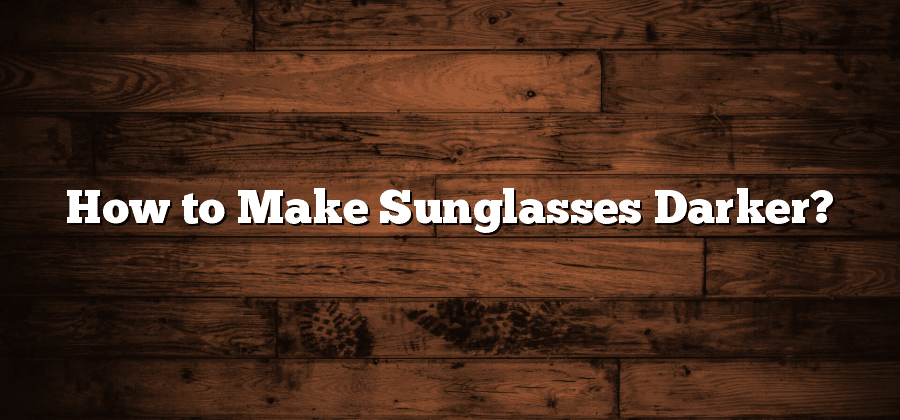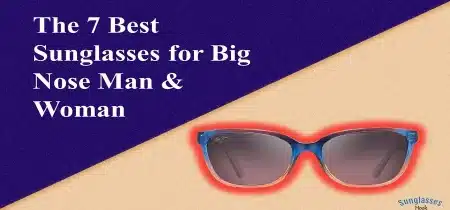If you’re looking for the perfect way to make your sunglasses darker, then you’ve come to the right place! Sunglasses are a great way to protect your eyes from the sun’s harsh rays, but if you’re looking for a more intense level of protection, you may want to consider darkening your lenses.
There are several ways to darken your sunglasses, some of which are more involved than others. Here’s a look at some of the most popular methods to make your sunglasses darker:
- Tinted Lenses: One of the simplest ways to darken your sunglasses is to buy tinted lenses. Tinted lenses are available in a variety of shades and densities, ranging from light to dark. Depending on the color of your lenses, you can find tinted lenses that will match your existing frames. If you don’t have tinted lenses, you can purchase tinted sunglasses frames as well.
- Lens Coatings: If you want to darken your sunglasses without tinted lenses, you can opt for lens coatings. Lens coatings are available for sunglasses in a variety of shades and densities. Many coatings are scratch resistant, so you don’t have to worry about them wearing down over time. Plus, lens coatings are easy to apply and can provide an extra layer of protection for your eyes.
- Photochromic Lenses: Photochromic lenses are a great way to darken your sunglasses without having to use tinted lenses or coatings. Photochromic lenses will adjust automatically to the amount of light they’re exposed to, so they can darken in bright sunlight and lighten in dimmer conditions. However, they don’t offer the same level of protection as tinted lenses or coatings.
- Polarized Lenses: Polarized lenses are another way to darken your sunglasses without having to use tinted lenses or coatings. Polarized lenses are designed to reduce the amount of glare that can be reflected off of surfaces, such as water or snow. This makes them ideal for activities such as driving, skiing, and fishing. Polarized lenses also provide an extra layer of protection for your eyes.
How do you test UV coating?
There are several ways to test the UV coating on eyewear, including the following methods:
- Ultraviolet light test: A simple way to test the UV coating on eyewear is to hold the glasses under a UV light. If the glasses are coated with a UV-blocking material, they should appear dark or opaque under the light. If the glasses are not coated or the coating is weak, they will appear light or transparent under the light.
- Fluorescent light test: Another way to test the UV coating on eyewear is to place the glasses under a fluorescent light and observe the reaction of the lenses. If the lenses are coated with a UV-blocking material, they should not fluoresce or glow under the light. If the lenses fluoresce or glow, the coating may be weak or absent.
- Water test: A simple way to test the water resistance of eyewear is to gently sprinkle water on the lenses and observe how the water beads up. If the water beads up and rolls off the lenses, the UV coating is likely effective. If the water spreads out and absorbs into the lenses, the UV coating may be weak or absent.
It is important to note that these tests are not definitive and may not be able to determine the exact level of UV protection provided by the eyewear. If you are concerned about the UV protection of your eyewear, it is always a good idea to consult a professional or refer to the manufacturer’s recommendations.
Do sunglasses block 100% of UV rays?
Most sunglasses are designed to block a significant portion of ultraviolet (UV) rays, but it is rare for sunglasses to block 100% of UV rays. The amount of UV protection provided by sunglasses can vary depending on the specific features and materials used in the eyewear.
UV protection is typically measured using a scale called the UV protection factor (UPF). Sunglasses with a UPF rating of 50+ are considered to provide good UV protection, blocking at least 98% of UV rays. However, it is important to note that no sunglasses can block 100% of UV rays, and it is always a good idea to wear sunscreen and protective clothing in addition to sunglasses when spending time outdoors.
When shopping for sunglasses, it is important to look for a pair that provides good UV protection and is labeled as meeting the relevant standards or certifications. You should also consider the fit and style of the sunglasses, as a good fit is essential for proper protection from the sun’s harmful rays.
Conclusion
No matter which of these methods you choose to darken your sunglasses, make sure to take proper care of them. Keep them clean and make sure to store them in a hard case when you’re not wearing them to protect them from scratches and other damage. With the right care, you can keep your sunglasses looking dark and stylish for years to come!



Recent Comments